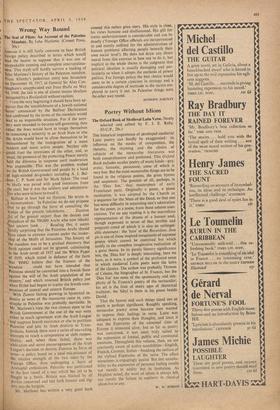Poetry Without Idiom
The Oxford Book of Medieval Latin Verse. Newly selected and edited by F. J. E. Raby. (O.U.P., 28s.) THE historical importance of developed mediaeval Latin poetry can hardly be exaggerated : its influence on the modes of composition, the rhetoric, the rhyming and the choice of subjects of the vernacular literatures was both comprehensive and profound. This Oxford Book includes secular poetry of many kinds—gay, erotic, fantastic, passionate, some of which is very fine. But the most memorable things are to be found in the religious poems, the great hymns and sequences. The greatest of all, perhaps, is the 'Dies Irm,' that masterpiece of early Franciscan piety. Originally a poem, a pious meditation, it was adopted by the Church as a sequence for the Mass of the Dead, so that one has some difficulty in separating one's admiration for the poem, as a poem, from those solemn asso- ciations. Yet on any reading it is the marvellous representation of the drama of a human soul, though expressed in terms of that terrible and poignant creed of which it is also an unforget- able statement: the 'turn' at the Recordare, Jesu pie is one of those inspired movements of supreme genius which cannot be contrived but which testify to the complete imaginative realisation of a great theme. In its purely literary significance too, the 'Dies lite' is deeply interesting; here we have, as it were, a symbol of the profound sense in which mediaeval Latin poets were the heirs of the classics. The author was probably Thomas of Celano, the biographer of St. Francis, but the 'Dies Irm' has none of the spontaneity and sim- plicity of St. Francis's poetry of the vernacular; his art is the fruit of many ages of rhetorical tradition; the Sibyl is there in his poem beside David.
That the hymns anti such things stand out so much is perhaps significant. Roughly speaking, vernacular poetry arose because men wanted to express their feelings in verse. Latin was adequate to express their thoughts, and since it was the Esperanto of the educated class of Europe it remained alive; but so far as poetry was concerned, it was most truly suited to the expression of formal, public and communal emotions. Throughout this volume, then, we are constantly aware of native sensibilities--English, French, German, Italian—breaking the surface of the stylised Esperanto of the verse. The effect sometimes is engagingly quaint. But this unsuita- bility to the expression of personal feeling results not merely in oddity but in limitation. As Hopkins noted, the want of idiom is always felt, not merely the failure to conform to classical idiom but to any.
Vv. W. ROBSON


































 Previous page
Previous page